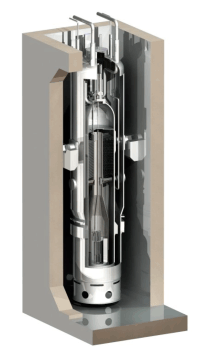forum
library
tutorial
contact

Looking to a Nuclear Future in Washington
by John StangCrosscut, January 29, 2015
|
the film forum library tutorial contact |

|
Looking to a Nuclear Future in Washingtonby John StangCrosscut, January 29, 2015 |
A Kennewick lawmaker's bills could help pave the way for new power generation technologies and greater public acceptance.
 A Kennewick legislator wants to nurture nuclear energy in Washington for the long run with a trio of bills -- legislation whose effects would likely be felt only in the next decade.
A Kennewick legislator wants to nurture nuclear energy in Washington for the long run with a trio of bills -- legislation whose effects would likely be felt only in the next decade.
The bills by Republican Sen. Sharon Brown went to a public hearing before the Senate Environment, Energy & Telecommunications Committee on Tuesday. Four committee members also belong to a House-Senate task force studying whether nuclear power should be expanded in Washington. The four are Brown, committee chairman Sen. Doug Ericksen, R-Ferndale, Sen. John McCoy, D-Tulalip, and Sen. Tim Sheldon, D-Potlatch.
The Legislature is exploring whether nuclear power should be a component of Gov. Jay Inslee's push to trim the state's carbon emissions as a way to combat global warming's detrimental ripple effects on Washington's shellfish industry, residents' health, snowpack, irrigation and increasing wildfires.
Republican legislators generally don't like Inslee's plans to cut emissions from smokestack industries, contending such effort would also kill jobs. But the GOP has helped push examination of nuclear power as a potential non-polluting source of electricity. So far, the bipartisan House-Senate task force has focused on small modular reactors as a part of the climate solution, and has not looked yet at nuclear fusion, a concept being looked at in Redmond.
One of Brown's bills calls for providing a sales tax exemption for building and selling small modular reactors that some Tri-Cities interests hope to eventually build and ship elsewhere. Another would declare nuclear power as an alternative power source under state programs to encourage renewable energy usage. If passed, that bill would classify the 1,150-megawatt Columbia Generating Station reactor operated by Energy Northwest near Richland as an alternative source along with solar and wind power. A third bill would encourage development programs for science teachers so they can teach nuclear science to eighth through 12th graders.
The tax break and alternative power bills sparked no opposition Tuesday. One citizen testified against the nuclear education bill.
Tri-Cities leaders want a Boeing-style assembly plant to build small modular reactors. This is a long-range plan in its infancy and is predicted to take roughly a decade to do if given a green light. "We have a very experienced work force that can handle the technology," Brown said.
Small modular reactors are tiny, prefab reactors whose parts are manufactured in one location, and then transported to the reactor site for final assembly. A modular segment would be a mini-reactor of 50 to 300 megawatts. Brown's bill would put a 50-megawatt limit - less than 1/20th the capacity of the Columbia Generating Station - for a reactor to be eligible for a tax break.
Small modular reactors are supposed to be designed so extra modules can be added as needed. This concept is still on the drawing board.
But Energy Northwest (a consortium of Washington public utilities), a small modular reactor design firm NuScale of Corvallis, Oregon, and the U.S. Department of Energy site at Idaho Falls have agreed to build a prototype there by 2024. Tri-Cities interests hope to attract mass production to a half-built, never-finished Energy Northwest reactor site at the Hanford reservation. The 50-megawatt limit in Brown's tax break bill fit with NuScale's design.
Supporters of the concept say this approach would make it cheaper to build reactors and easier to tailor reactors complexes to meet a region's needs. Prefabrication and duplication would make construction easier. "A big component in this is the exporting of the reactors," Sen. Ericksen said.
Energy Northwest, the American Nuclear Society and the Association of Washington Business testified in favor of the proposed tax break.
However, critics of the concept have warned that many pitfalls could await a small modular reactor industry. These include the lack of track records on safety, cost and reliability for small modular reactors. The nation does not have a repository for used nuclear fuels -- a problem that would grow with new reactors. Also, a major customer base for small modular reactors would be in foreign nations, which increases nuclear proliferation concerns. And the investment community has been skittish about getting involved with this fledgling industry, critics contend.
learn more on topics covered in the film
see the video
read the script
learn the songs
discussion forum
